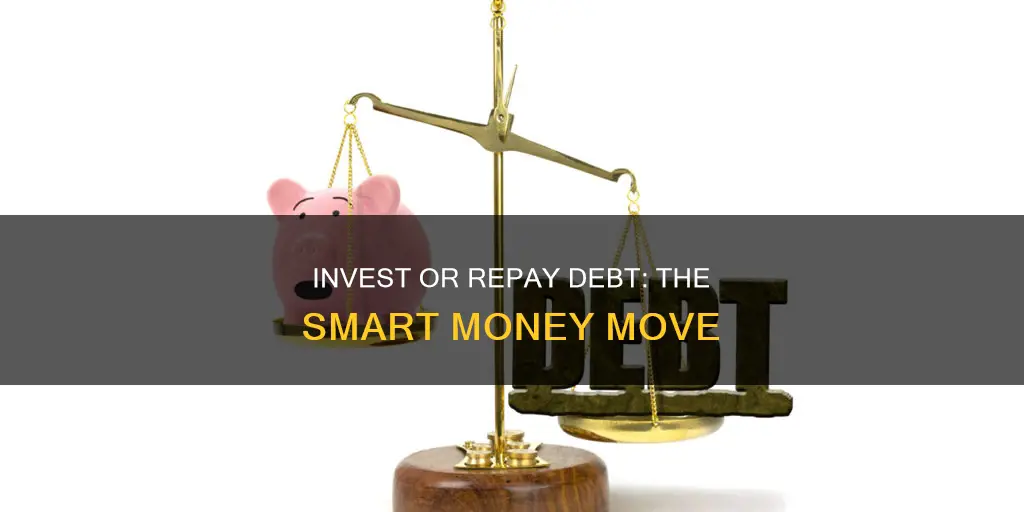
Whether to invest or pay off debt is a common dilemma. Both are good uses for any spare cash, but which is the smarter choice?
Well, it depends. If you're carrying high-interest credit card debt, it often makes more sense to focus on wiping out the debt as quickly as possible, rather than trying to invest. However, if you have a loan or credit card with a low-interest rate, you may be better off investing your money, as you can reasonably expect to earn more on your investments than you're paying in interest.
It's also important to consider your risk tolerance and overall financial situation. If you're losing sleep over your debts, you may want to prioritise paying them off, even if investing might offer a better return. On the other hand, if you're comfortable taking a gamble on the stock market, investing could be the right choice for you.
In an ideal world, you'd be able to do both.
| Characteristics | Values |
|---|---|
| Interest rate on debt | If the interest rate on your debt is 6% or more, it is generally better to pay off debt before investing. |
| Interest rate on investments | If your investments are likely to earn less than your debt costs in interest, it is better to pay off debt first. |
| Type of debt | Credit card debt is usually high-interest and should be paid off first. |
| Retirement timeline | It is generally best to avoid bringing debt into retirement, so consider your retirement horizon when deciding how quickly to pay off debt. |
| Credit score | Paying off debt can improve your credit score, which is important if you want to buy a home or finance a vehicle. |
| Risk tolerance | If you are comfortable with the risk of investing in the stock market, investing may be a better option. |
| Budget | Create a budget to identify how much money you can spend on debt repayment or investing. |
| Emergency fund | It is recommended to have an emergency fund before investing or paying off debt. |
| Company retirement plan | Review your company's retirement plan and take advantage of any matching contributions. |
What You'll Learn

Weigh up interest rates
Weighing up interest rates is a good way to decide whether to invest or pay off debt.
If you can earn more interest on your money by investing it than the amount you are paying in interest on your debt, then it makes sense to invest. For example, if you have a mortgage with an interest rate of 5% and you invest in a stock market index fund that is returning 10% a year, you will make more money by investing.
However, it is not always that simple. Investments can be volatile, and the return on investment is not always guaranteed. On the other hand, the return on paying off debt is guaranteed—for every dollar of debt you pay off, you avoid paying extra interest on that dollar. Those who are risk-averse may prefer to take the guaranteed interest rate and pay off their debt.
A common rule of thumb is that if the interest rate on your debt is 6% or more, you should pay it off before investing additional money towards retirement. This rule assumes that you have emergency savings, have fully captured any employer match on your investments, and have paid off any credit card debt. It also assumes that you are investing in a tax-advantaged account and that the interest on your debt is not tax-deductible.
If the interest rate on your debt is less than 6%, it may make more sense to invest, as there is a greater chance that your long-term investing returns will be higher than the benefit of paying off your debt faster.
However, it is important to note that this rule of thumb may not apply to everyone, and there are other factors to consider. These include your personal income, balance sheet, time horizon, risk profile, and tax efficiencies. For example, if you have a conservative risk profile, you may be more likely to pay off debt rather than invest. On the other hand, if you are comfortable with risk, investing offers the potential for higher returns over the long term.
Another factor to consider is your credit score. Paying off debt, especially credit card debt, can improve your credit score, which can be important if you want to borrow money in the future or affect other aspects of your life, such as insurance premiums or renting an apartment.
In summary, weighing up the interest rates on your debt and potential investments is a crucial factor in deciding whether to invest or pay off debt. However, it is important to consider other factors and seek financial advice to determine the best course of action for your individual circumstances.
Investor Influx: Impacting Markets
You may want to see also

Consider your risk tolerance
When deciding whether to invest or pay off debt, it's important to consider your risk tolerance, which is the degree of risk that an investor is willing to take on. This is influenced by factors such as age, investment goals, income, and financial circumstances.
Understanding Your Risk Tolerance
Risk tolerance is an important component of investing, as it often determines the type and amount of investments an individual chooses. It is a measure of the degree of loss an investor is willing to accept within their portfolio. It's important to understand that all investments involve some level of risk, and this risk can vary depending on the type of investment. For example, stocks, equity funds, and exchange-traded funds (ETFs) are typically associated with a higher risk tolerance, while the purchase of bonds, bond funds, and income funds is more suited to those with lower risk tolerance.
Assessing Your Willingness to Take Risks
Everyone has a different comfort level with risk, and this can influence your investment decisions. Some people are more conservative and risk-averse, while others are more aggressive and willing to take on substantial investment risks. It's important to assess your own willingness to take risks and how comfortable you are with market volatility. This self-assessment can help guide your investment choices and determine whether you are more comfortable with a conservative, moderate, or aggressive investment strategy.
Evaluating Your Financial Ability to Take Risks
In addition to your willingness to take risks, it's crucial to consider your financial ability to do so. This involves assessing factors such as your liquidity or cash needs, time horizon, and the importance of the financial goal to your overall well-being. For example, if you need cash for a specific goal in the short term, taking on risky investments may not be advisable. On the other hand, if you have a long time horizon and can withstand market ups and downs, you may have a higher risk ability.
Managing Market Volatility
It's important to recognize that investments can be volatile, and their value can fluctuate. While some individuals may be comfortable with the idea of their investments rising and falling with the market, others may find this stressful and prefer more stable investment options. Understanding how you manage market volatility can help you choose investments that align with your risk tolerance.
Adjusting Your Investment Strategy
Your risk tolerance may change over time as your financial situation, goals, and cash needs evolve. Therefore, it's important to regularly review and adjust your investment strategy accordingly. This may involve reevaluating your asset allocation, risk willingness, and financial ability to ensure that your investments continue to align with your risk tolerance and overall financial goals.
In conclusion, when deciding between investing and paying off debt, carefully consider your risk tolerance by assessing your willingness to take risks, financial circumstances, and comfort level with market volatility. This will help guide your investment choices and ensure that you make informed decisions that align with your financial goals and risk appetite.
Elon Musk's Current Investment Focus
You may want to see also

Think about your credit score
When deciding whether to invest or pay off debt, it's important to think about your credit score and how it might be affected.
Your credit score is a number that can be very important if you want to borrow money in the future, such as taking out a mortgage or a car loan. A low credit score can mean paying higher interest rates, and may even impact whether you can get a loan at all. Your credit score can also affect other areas of your life, such as the premiums you pay for insurance, your ability to rent a property, and even whether an employer will hire you.
The amount of debt you owe on your credit card is one of the biggest factors affecting your credit score. This is known as your credit utilisation ratio, which is the ratio between the amount of debt you owe on a credit card and the card's credit limit. It's recommended that you keep your credit utilisation level at less than 30% in total. Maxing out your credit card can cause your credit score to go down, as lenders may assume that you're living beyond your means.
Paying off debt can help improve your credit score, especially if you pay off more than the minimum payment each month. However, it's important to note that paying off debt may sometimes cause a slight decrease in your credit score, especially if it affects factors such as your credit mix, the length of your credit history, or your credit utilisation ratio. For example, if you pay off your only line of credit, such as an auto loan or mortgage, it could negatively impact your credit mix, as creditors like to see that you can manage different types of debt. Similarly, if you pay off a credit card and close the account, your credit score could drop as your total available credit is lowered, which may result in a higher credit utilisation ratio.
If you're deciding between investing and paying off debt, it's important to consider the impact on your credit score. While investing can provide potential growth, paying off debt can help improve your creditworthiness and may provide more financial freedom in the long run.
Smart Ways to Invest $25,000
You may want to see also

Plan for retirement
Retirement planning is a long-term process that requires careful financial decision-making. Here are some key considerations and strategies to help you plan effectively for retirement:
- Start with budgeting: Understand your basic expenses, such as rent, utilities, transportation, and groceries. If you can cover these with ease and have money left over, you're on the right track.
- Save for emergencies: Before investing or paying off debt, build an emergency fund to cover unexpected expenses like car repairs, medical bills, or job loss. Aim for three to six months' worth of expenses.
- Take advantage of company retirement plans: Many companies offer to match a percentage of your 401(k) or 403(b) contributions. This is essentially free money, so be sure to maximise these contributions before exploring other investment options.
- Prioritise paying off high-interest debt: Focus on clearing debt with high-interest rates, such as credit card debt, which can accumulate significant interest over time. This will save you money and may free up cash for investing or boosting your emergency fund.
- Understand investing basics: Investing in the stock market or other financial instruments can help build wealth over time. However, it comes with risks and potential volatility. Understand the basics of investing and assess your risk tolerance before diving in.
- Compare investment returns and debt interest rates: When deciding between investing and debt repayment, compare the expected returns on investments with the interest rates on your debts. If you can earn more through investing, it may be worth prioritising over low-interest debt repayment.
- Consider your risk tolerance and peace of mind: Investing involves risk, and debt can cause stress. Consider your personal risk tolerance and the importance of peace of mind when making financial decisions.
- Social Security benefits: In the US, you can apply for Social Security retirement benefits anytime between age 62 and 70. The amount you receive will be higher if you wait until your "Full Retirement Age," which is between 66 and 67. You can check your Social Security account to estimate your benefit amount at different ages.
- Retirement savings legislation: Keep informed about retirement savings legislation, such as the Retirement Savings for Americans Act (RSAA), which could impact 401(k) tax incentives and contribution limits.
Renewable Energy: Our Future's Investment
You may want to see also

Consult a financial advisor
Consulting a financial advisor can be a great way to help you decide whether to invest or pay off debt. They can help you create a plan to manage your debt and establish a budget. When looking for a financial advisor, it is important to check their credentials. A reputable financial advisor will typically be certified as a financial planner (CFP) or a chartered financial consultant (ChFC). Some advisors have both credentials.
When you first meet with a financial advisor, bring important financial documents such as bank statements, credit card bills, loan statements, pay stubs, and tax returns. They will use these to map out your cash flow and identify existing and potential problem areas. They can then help you draft a budget that covers your necessary expenses and reduces your debt. This may involve cutting unnecessary expenses and allocating more money to pay off existing debt.
Financial advisors can also help you analyze and restructure your debt. They will typically recommend paying off debts with the highest interest rates first, which is known as the "debt avalanche" strategy. They can also look at options for consolidating debt to secure a lower interest rate, such as a homeowner taking out a home equity loan to pay off credit card balances.
Financial advisors can also help you establish a long-term plan, taking into account all your financial goals. For example, they can advise on life insurance, emergency funds, and retirement savings accounts. They should provide you with a written plan that includes financial milestones and red flags so you can track your progress.
When deciding whether to invest or pay off debt, it is important to consider the interest rate on your debt and the potential return on your investments. If you can earn more on your investments than your debts are costing you in interest, then investing may make sense. However, if you have high-interest debt, especially credit card debt, paying that off first may be a better option.
Madoff Victims: A Long List of Investors
You may want to see also
Frequently asked questions
Paying off debt first can reduce the amount of interest you will have to pay, improve your credit score, and reduce financial and mental stress.
Investing early can allow you to take advantage of compounding interest, which can help your money grow without any extra effort.
Focus on paying off this debt as quickly as possible. Credit card interest rates are typically high and can accumulate faster than your investment returns.
If the interest rate on your debt is lower than the expected rate of return on your investments, it may make more sense to invest your money instead.
Yes, it is possible to do both. You can start by creating a detailed budget and setting financial goals. You can also consider debt relief options, such as debt consolidation loans, to lower your monthly payments and interest charges.







